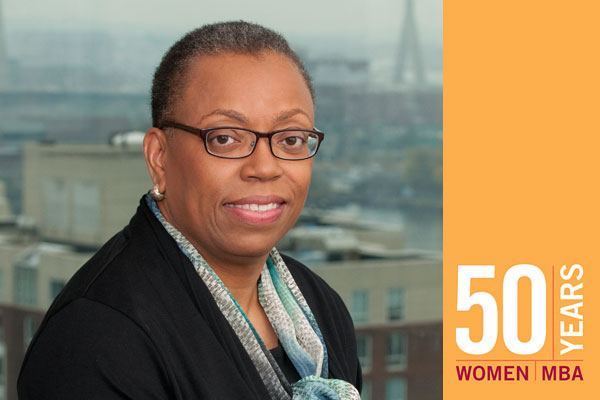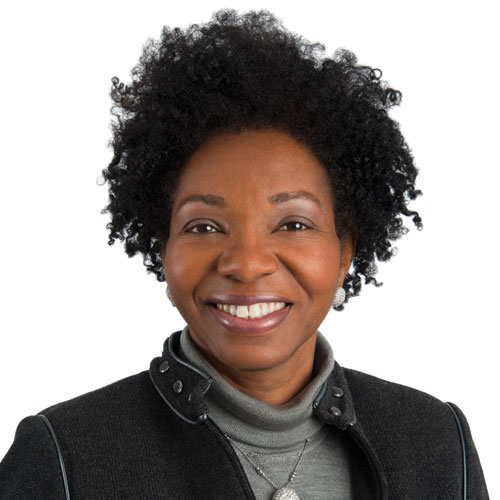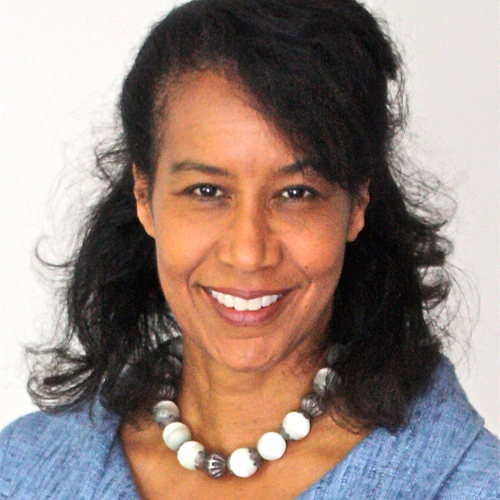
Rena Clark
Biography
Rena Clark was born and raised in Beaumont, Texas, where she graduated from Hebert High School in 1979 as her class salutatorian. She then enrolled in the School of Engineering at Lamar University and began her studies in the mechanical engineering department. During her time at Lamar, she served as a math and engineering tutor and was vice president and president of the Lamar chapter of the National Society of Black Engineers.
The youngest of three children, Rena Clark was born and raised in Beaumont, Texas, a Gulf Coast city historically dominated by the petrochemical industry. Her father worked for a refinery and her mother was a registered nurse. "My parents raised us to be self-sufficient, independent thinkers," Clark says, "but they also taught us through example to have a sense of responsibility for others." A teacher at her public high school encouraged girls like Clark, with an aptitude for math and science, to consider a wide range of career paths. Always curious about how things worked, she chose to pursue a degree in mechanical engineering at nearby Lamar University, gaining experience in the field through the department's co-op program. As graduation approached in the spring of 1984, Clark had numerous offers from employers in the oil and gas industry.
Always involved in many activities, as a college senior Clark served as president of the Lamar chapter of the National Society of Black Engineers (NSBE). At the organization's annual conference that year she was one of six outstanding students, selected from a nationwide pool, who received an award sponsored by General Electric. The honor included the opportunity to interact with senior GE executives, and Clark was soon recruited for a two-year manufacturing management program. Her assignments took her to GE's massive facilities in Kentucky and Virginia, and later she accepted a job at their Daytona Beach, Florida plant.
As her work expanded to include more managerial responsibilities, Clark considered pursuing a part-time MBA program at a local college. But a GE mentor with whom she maintained contact encouraged her to think more expansively about full-time programs at leading business schools. "My mother taught me that I could do and be whatever I wanted," she says of that critical juncture when the acceptance letters arrived. I understood that [admission to HBS] was a blessing to be taken advantage of and not feared."
Each new MBA section selects peers to fill a variety of leadership positions, and soon after Clark arrived at HBS she was elected Section H "Ed Rep," a key role that involves serving as the conduit between students and the faculty and as a peer advisor for those experiencing difficulties. After preparing cases until midnight or 1 a.m., it was not uncommon for Clark to stay up until 2 or 3 in the morning, listening to her classmates' concerns and helping to develop plans to address them.
In the classroom, Clark sat next to Jonathan Kraft, with whom she initially thought she had little in common apart from a fanatical love of sports. An enduring friendship began to develop after Clark joined Section H's women's intramural flag football and basketball teams, which achieved winning records with Kraft as their coach. And as Ed Rep, Clark was delighted to work closely with fellow Texan James Cash, the school's first tenured African American professor. She will never forget his first day in their classroom. "I was frankly proud of who he was and what he stood for," she recalls, "but there is always a tendency to want to test faculty members, and he was the first person of color to stand in front of our section. On the third day, about three minutes into a student's opening, Jim stopped the guy cold and busted him for not having read the case. It set the tone for the rest of the course. We understood that we were going to have a focused, productive learning environment."
Clark joined Bain after graduation. She had been on the job for a year when she received an unexpected call from Jim Cash, who had been named faculty chair of the MBA Program. Cash asked Clark to return to HBS as COO of MBA Program administration, a role not held before by an African American. "People have asked why I took a job in academia, but I viewed it as a tremendous opportunity to work with someone I respected and trusted," she explains. "And it was an exciting time. During the four years I was there, Jim led a comprehensive evaluation and analysis of every aspect of the MBA learning experience and launched innovations that were implemented over the next ten years. It was impressive to see the way he handled the incredible undertaking of managing change at HBS."
The experience also ignited a desire to run her own show, and after leaving HBS a second time and networking with several HBS alumni, Clark made her first entrepreneurial investment with a partner in 1995. Over the next six years they acquired, turned around, and sold a middle-market manufacturing company, providing a substantial return to investors. Clark also took an ownership stake and CEO role with a second firm. But in 2001, she was ready for a change. Her original plan was to take time off, regroup, and return to another entrepreneurial venture. But as that search continued, Clark had an epiphany: "The community work I was doing at the time was tremendously rewarding. I realized I should instead be looking for an opportunity that would allow me to do that professionally."
Clark's refocused career search ultimately allowed her to marry her passions for community service and sports. Since their graduation from HBS, Jonathan Kraft's family had purchased the New England Patriots, and as president and COO of the team, Kraft was helping to rebuild the franchise and leading a remarkable organizational transformation. The classmates had stayed in contact over the years and when Clark described her current interests, Kraft replied that he and his family were looking for someone to head up their community affairs and philanthropic activities.
"I fell in love with the Kraft family's commitment to the community, and I quickly understood that the Patriots brand could be leveraged to have impact in many areas," Clark explains. She joined the Kraft Group and the New England Patriots in 2003. The following three years were the most successful in franchise history, with three consecutive division titles and two Super Bowl championships. Clark was responsible for all team-related community and corporate affairs and outreach programs. She also oversaw the charitable giving efforts for the New England Patriots Charitable Foundation (NEPCF) and the Kraft Group, including grants, scholarships and in-kind donations to nonprofit organizations throughout New England. In 2005, Clark made another life-changing decision: adopting her daughter, Sydney. "She has reordered the stars and my priorities," Clark observes with deep affection and maternal pride. "She's a blessing and the best thing I've ever done."
Looking back on her choices, Clark, who in 2009 became a partner with private equity buyout firm GenNx360 Capital Partners, admits her career path has been far from linear. "I'm not a big fan of connecting the dots," she says. "Introspection should include self-criticism, but I don't think I've ever worried about what other others think of my decisions. Nor have I felt the need to stack up my achievements against someone else's. Some of that is a result of where I come from and whom it is my folks raised. At the core, it's about knowing yourself. But when you do, you will understand what truly satisfies your soul, and decisions will not seem so overwhelming. I also truly believe that unless you've arrived at this stage of your life without any assistance or encouragement, your decisions need to include taking the time to be of service to others."
This material was adapted from a profile of Rena Clark published on the occasion of her receiving the HBSAAA's Bert King Award in 2007.

